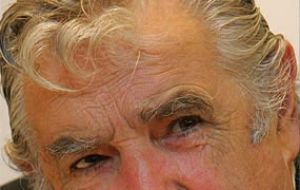MercoPress. South Atlantic News Agency
Disenchantment factor ahead of next Sunday’s Uruguayan presidential runoff
 Opinion polls show Mujica as Uruguay’s next president
Opinion polls show Mujica as Uruguay’s next president With less than a week for Sunday’s runoff when Uruguay’s next president will be definitively elected, public opinion polls show support for both candidates “frozen” with a significant percentage undecided or with the intention of voting blank or spoiling their vote.
The incumbent candidate Jose “Pepe” Mujica has a vote intention ranging from 48 to 50% and his conservative rival Luis Alberto Lacalle, 40 to 42%, according to the three main pollsters.
The polls included 1.000 interviews covering the whole Uruguayan territory with a plus/minus error of 2 to 3 percentage points.
“Unless something really intense and weird happens in the last six days, Mujica is the next president”, said Sociologist Ignacio Zuasnabar from Equipos Mori pollster.
“Following the first round at the end of October the percentages have remained virtually frozen and it seems unlikely they should change in the last week”, he added.
In the October round the ruling catch-all coalition of the Broad Front managed 48% of the vote; the main opposition National party, 29% and the junior opposition Colorado party, 18%.
According to opinion polls, 70% of the Colorado vote will support Lacalle, 10% Mujica and 20% remain undecided, although at last moment it is believed that most of these voters will turn for the opposition candidate.
However this “freezing” of vote intention for both candidates is showing that there is a percentage of the Uruguayan population that is not pleased with either option.
“We can estimate this percentage anywhere from 6 to 8% who are disenchanted both with Mujica and Lacalle, otherwise the projections should be more decisive”, said pollster Mario Doyenart, who believes that anyhow the next president will be Jose Mujica.
Mujica a former guerrilla leader has limited or tepid support from a significant percentage of the ruling Broad Front voters who fear possible bouts of populism with Mujica or disagree with his rather coarse language and manners and would have preferred his running mate, Economist Danilo Astori to lead the ticket.
Similarly in the opposition the National party is split among followers of former president Lacalle, who is seen as rather arrogant, allegedly corruption-stained from his first administration (1990/1995) and his vice-president hopeful Jorge Larrañaga, a more accessible candidate but who was defeated in 2004 by current President Tabare Vazquez and last June in his party’s primaries lost (unexpectedly) to Lacalle.
To everybody’s surprise the National party lost in electoral circumscriptions traditionally solid loyal. It is estimated Larrañaga’s grass root leaders did not work for the ticket. This will be tested in the municipal elections scheduled for next May.
During the first round at the end of October a similar phenomenon happened: as voting day approached only the undecided and blank or spoilt vote kept steadily increasing, something most unusual in Uruguayan electoral history.
“It’s a poor campaign, signalled by mistakes and bloopers from both sides, rather than interesting events, ideas and proposals. In this scenario no surprises can be expected”, concluded Zuasnabar.
Next Sunday who ever of the two candidates cross the 50% vote line is the next Uruguayan president and will be taking office March first.
Under Uruguayan law a ban on all political activity and electoral propaganda becomes effective Friday zero hours.




Top Comments
Disclaimer & comment rulesCommenting for this story is now closed.
If you have a Facebook account, become a fan and comment on our Facebook Page!